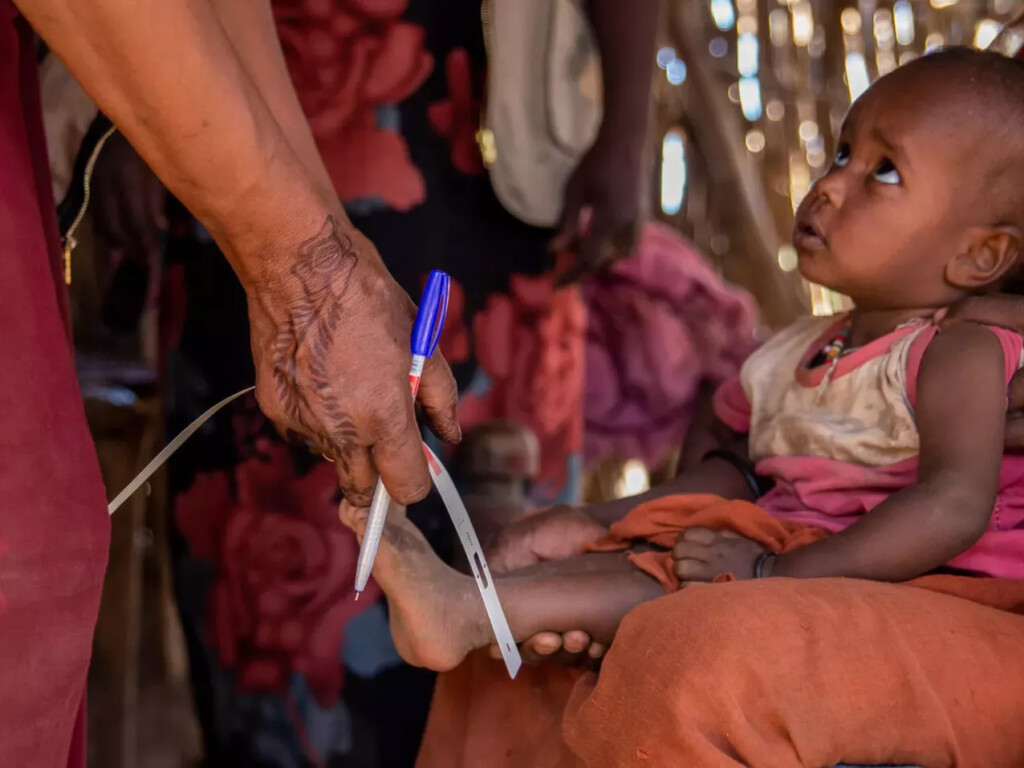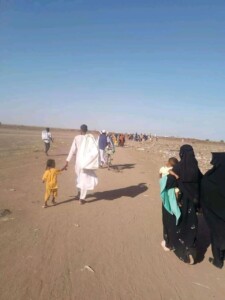MSF reports ‘staggering malnutrition data’ from across Sudan, UNICEF warns of the implications for the future

In Aroma in Kassala, teams of health volunteers have been screening children for malnutrition as part of a UNICEF-supported door-to-door nutrition campaign (Photo: UNICEF / Rajab)
Médecins Sans Frontières (MSF) yesterday renewed its call for immediate action to prevent more starvation in Sudan, and urged the international community “to pursue all options” to reach the more than 24 million people suffering from hunger in the country . The United Nations Children’s Fund (UNICEF) last week warned that the soaring malnutrition rates will have grave implications for the country’s future.
In 2024, admissions for severe acute malnutrition (SAM) in Sudan rose by 43.8 per cent compared to 2023, with 431,015 children treated—the highest annual total since the programme’s inception, UNICEF states in its Sudan Humanitarian Annual Situation Report over 2024.
MSF in a press release yesterday warned that “the already catastrophic situation is expected to worsen this year”, calling on international donors, the UN, Sudan’s warring parties and their allies to “act now to prevent even more avoidable deaths from malnutrition in Sudan.
The international medical organisation cites the latest Integrated Food Security Phase Classification (IPC) report that stated that about 24.6 million people, half of Sudan’s population, face high levels of acute food insecurity – among whom 8.5 million people face an emergency or famine-like situation.
“Despite this new wake-up call, robust humanitarian and diplomatic mobilisation to act on aid deliveries has fallen far short of the needs. To provide only those in the most extreme situation with monthly food rations, 2,500 aid trucks per month would be required, whereas only about 1,150 crossed into Darfur between August and December,” says Stephane Doyon, MSF operations manager.
MSF released data showing horrific rates of malnutrition in multiple locations, both at the height of Sudan’s lean season last year and as recently as December 2024.
Huge challenges
Both MSF and UNICEF speak of ‘a daunting challenge’ to reach the needy. “The ongoing conflict makes transporting supplies around the country extremely time consuming as permit approvals, checkpoints and cargo inspections add days or even weeks to journeys, UNICEF stated in an article last week.
MSF also points to “the continued obstruction of aid by both of Sudan’s warring parties and by the neglectful inertia of the UN and aid system in Darfur. With the seasonal hunger gap coming in May, decisive action must be taken now.
“Parts of Sudan are difficult to work in. But it is certainly possible, and this is what humanitarian organisations and the UN are supposed to do,” said Marcella Kraay, MSF emergency coordinator, speaking from Nyala, South Darfur.
“In places that are easier to access, as well as in the hardest to reach areas like North Darfur, options like air routes remain unexplored. The failure to act is a choice, and it’s killing people,” she added.
The medical INGO also cautions that the moving of supplies “will become an even more difficult task during the upcoming rainy and lean season, when flooded dirt roads become impossible to navigate. A wide-scale humanitarian response must be launched now, including by drastically increasing available funding and logistical capacities, securing food pipelines and prepositioning food stocks in Chad and neighbouring countries.”
Therefore, MSF urges “UN agencies, international organisations, donor countries, and governments with leverage to pursue all options, including air routes, to complement and even replace road access where necessary”.
‘Generational crisis’
UNICEF also warns that, as the devastating war approaches its second year, “Sudan risks a lost generation, with grave implications for the country’s future”.
As “even when children recover, malnutrition can have lifelong effects on a child’s development. Undernourished children may be affected by stunting, wasting or both. Those affected by stunting are too short for their age, and their brains may never develop to their full cognitive capacity, hindering their ability to learn as a child, earn as an adult, and participate meaningfully in their communities,” the agency cautions.











 and then
and then